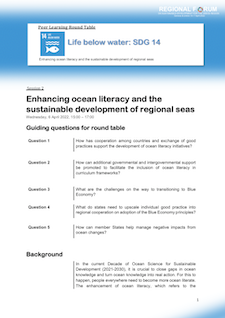About the event
In the current Decade of Ocean Science for Sustainable Development (2021-2030), it is crucial to close gaps in ocean knowledge and turn ocean knowledge into real action. For this to happen, people everywhere need to become more ocean literate. The enhancement of ocean literacy, which refers to the understanding of interdependencies between humans and the ocean, is critical to the success of the Ocean Decade.
In this context, the Blue Economy concept has been gaining considerable momentum. In the Blue Economy, oceans are no longer perceived as a means of free resource extraction and waste dumping, but ocean values and services will be incorporated into economic modelling and decision-making processes.
Regional seas and their multilateral agreements and governing bodies represent a conducive framework and solid foundation for launching the blue economy at basin level. Ports and terminals, transport routes, marine tourism infrastructure, trade, marine ecosystems and resources, coastal areas, and pollution are areas of cooperation among the littoral states with great potential for the strengthening the blue economy at regional level.
Moreover, under future anthropogenic warming, marine heatwaves are projected to further increase in duration, intensity, frequency and spatial extent. Projections show that frequencies of marine heatwaves will be 20 times higher at 2° C warming in comparison to pre-industrial levels. Impacts of average and extreme warming include mass mortalities of coastal species and large-scale bleaching of coral reefs as well as shifting fish stocks with reduced fisheries results.
Information and communication technologies also have a critical role to play for ocean and climate monitoring as well as for disaster warning. One pertinent example is the “Science Monitoring and Reliable Telecommunications (SMART) Subsea Cables” that can measure essential ocean variables while providing a resilient communication infrastructure.
This roundtable aimed to stimulate exchanges between governments, scientists, and other relevant stakeholders to discuss policy actions, progress and challenges faced regarding ocean literacy, the sustainable development of regional seas and the related use of information and communication technologies as well as monitoring and early-warning systems.
UNESCO, UNEP | Contributors: ITU, UNIDO, WMO



